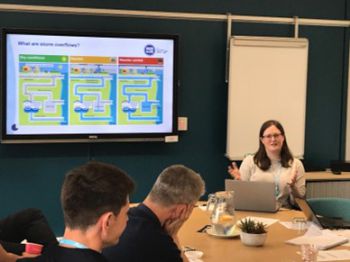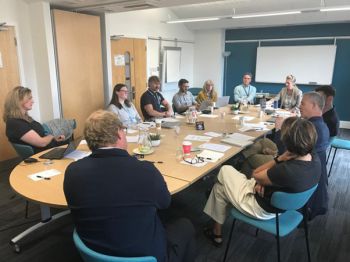University and Southern Water explore how transformative innovation can address challenges facing water industry
Posted on behalf of: Transformative Innovation Policy Consortium
Last updated: Friday, 20 June 2025

Southern Water colleagues outline storm overflow system currently in place.

The group discusses the benefits of applying TIPC-developed tools
University and Southern Water team explore how transformative innovation can address major challenges facing the water industry
Earlier this month, a team from Southern Water, working to reduce the use of storm overflows, as well as improve the quality of bathing water, met for a campus learning exchange with staff from the Transformative Innovation Policy Consortium (TIPC) and SPRU at the University of Sussex Business School.
The meeting provided an opportunity to explore some of the challenges facing the water industry and how University research can be used to address these.
In recent years, the issue of storm overflows releasing through outfalls into rivers and the sea has become a key issue for local communities. Although overflows are an intentional design of the wastewater network, and permitted by the Environment Agency to stop homes and businesses flooding when large volumes of rain or groundwater enter the sewer system, erratic weather caused by climate change and other factors have added pressure on the system.
At the meeting on campus, Nicole McNab, Head of Strategic Partnerships at Southern Water, outlined a number of interventions that the company is putting in place to reduce the volume of rainwater going into combined sewers.
These include optimising existing infrastructure and installing rain gardens, as well as water butts in urban areas. Where possible, the team look to partner with organisations in the region to identify innovative solutions to slow the volume of rainwater going into combined sewers.
Nicole highlighted the crucial role of collaboration for initiatives to have real impact. ‘We can’t do this on our own,’ she said. ‘We’d like to work closely with customers and local authorities right across the region to understand how we can tackle shared challenges head on, as well as implementing more sustainable drainage systems in our communities. It’s a huge and incredibly complex challenge, but a very important one.’
Victoria Shaw and Matias Ramirez from the University of Sussex Business School outlined core concepts developed by TIPC that might support this work.
Drawing on tools in the Consortium’s Resource Lab, Victoria introduced how socio-technical systems mapping can help companies and other actors to deepen their understanding of a systemic challenge and make strategic choices about pilot interventions.
Matias highlighted the vital role of experimentation and the need to nurture ‘niches’ – spaces where new ways of doing things to challenge the status quo can be trialled – and protect them from the mainstream pressures of the prevailing system.
‘With a system as complex and multifaceted as water management, it is crucial we don’t end up making tweaks to the existing system,’ he said. ‘Instead, there is an opportunity to take a systemic approach and work with Transformative Outcomes to enact, evaluate and scale interventions.’
‘TIPC methods have been built up over eight years through partnerships between international policy makers and researchers,’ said Victoria Shaw, summing up the session. ‘This was a valuable opportunity to test how they might be applied to a critical issue affecting the local region. We are grateful to the Southern Water team for their openness to shared learning.’
